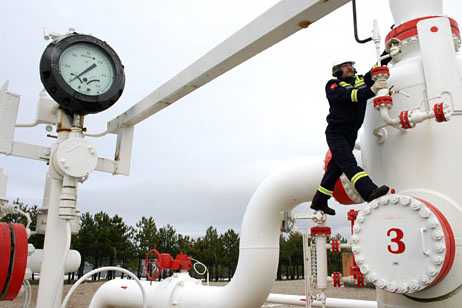The giant stone heads scattered around Mount Nemrut in south-eastern Turkey combine several cultures. Raised in 62 BC, these statues of Greek, Armenian and Iranian gods have Hellenic faces but wear Persian hats, testament to their builder, King Antiochus.

A worker checks the valve gears at a natural gas storage facility in Kinali. Turkey is heavily dependent on imports of oil and natural gas. Osman Orsal / Reuters
Today, as the sun sets behind the Atatürk dam to the south, their blind eyes look out over a key pipeline – part of Turkey’s energy policy, which also must balance East and West.
Turkey receives less energy attention than it should. The European Union tends to consider it primarily as a transit country for oil and gas from the Caspian and Middle East.
But Turkey is the fourth-largest gas market in Europe (outside the former Soviet Union), and the only one that is growing strongly – more than 11 per cent a year over the past decade. By 2020, it could well be the continent’s largest gas consumer.
With Europe mired in recession, Turkey grew 8.5 per cent in 2011, even if a slowdown last year raised concerns. Inflation has been mostly brought under control, its young population is the second-largest in Europe (just behind Germany) and public debt is modest.
With little domestic petroleum, the country relies heavily on gas imports. Expensive energy purchases comprise two thirds of a worryingly high current account deficit. More than half of Turkey’s gas comes from Russia, known to use energy as a geopolitical tool; a further 18 per cent from Iran, often cut off in winter. Iranian supplies are coming under pressure from United States-inspired sanctions and restrictions.
Ankara-Tehran relations have suffered further over the conflict in Syria. Increased use of coal, nuclear and renewable energy can slow, but not reverse the growth in gas requirements.
In principle, Turkey’s geography presents it with ideal solutions. The EU long sought to encourage it to become the “fourth corridor” of gas imports (the other three running from Russia, North Africa and Norway), via the Nabucco Pipeline. But Turkey’s own energy needs are more important for its policy than any desire to assist the EU – especially after being cold-shouldered for membership.
To the east, Turkish policymakers look out over the gas-rich Caspian – Azerbaijan and Turkmenistan – speaking languages closely related to Turkish. To the south-east, Iraq and its Kurdish region, Ottoman provinces less than a century ago. To the south-west, massive new gas finds in the deep waters of the eastern Mediterranean.
But all of these regions are politically problematic. The Caspian is the most straightforward – Turkey already buys Azeri gas. The new Trans-Anatolian pipeline will expand imports, and run westwards to connect to EU markets – either Italy or, via a scaled-down version of Nabucco, into central Europe.
But eccentric, isolationist Turkmenistan has not reached agreement with Azerbaijan on laying a pipeline under the Caspian Sea, where the two countries dispute a border – nor is there much reason for the Azeris to facilitate a rival.
Baghdad seems in no hurry to expedite its own gas exports, and relations with Ankara are poor – over Syria, where the two capitals back opposite sides, and over Turkish support for oil exports from the Kurdish region of Iraq. But it would be a dramatic move for the Turks to permit an independent gas pipeline from the Kurdish region- condoning effective Kurdish independence and breaking relations with Baghdad.
And in the Mediterranean, Turkish relations with Israel are cold, Syria is in chaos, and the continuing dispute over the divided island of Cyprus blocks pipeline routes.
Ankara’s policy of “zero problems with neighbours” has rapidly transformed into “many problems”.
To meet its needs, Turkey needs to emulate King Antiochus and rebuild constructive relations with at least some of its energy-rich neighbours.
Robin Mills is the head of consulting at Manaar Energy, and the author of The Myth of the Oil Crisis and Capturing Carbon
via Turkey should look to an ancient king for tips on energy – The National.

Leave a Reply